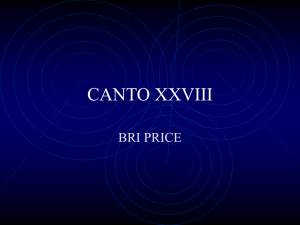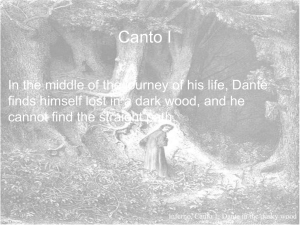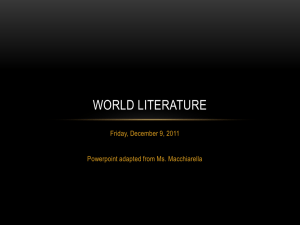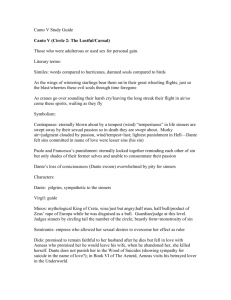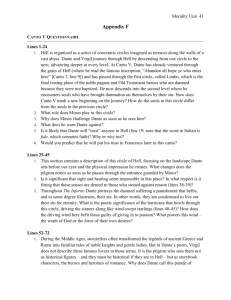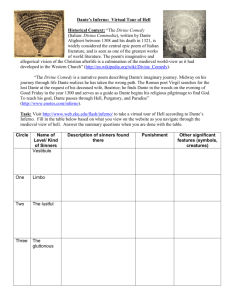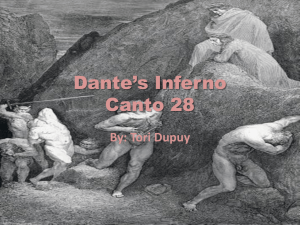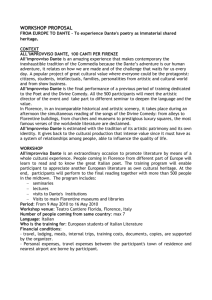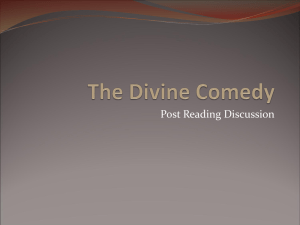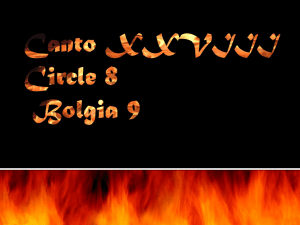The Inferno
advertisement
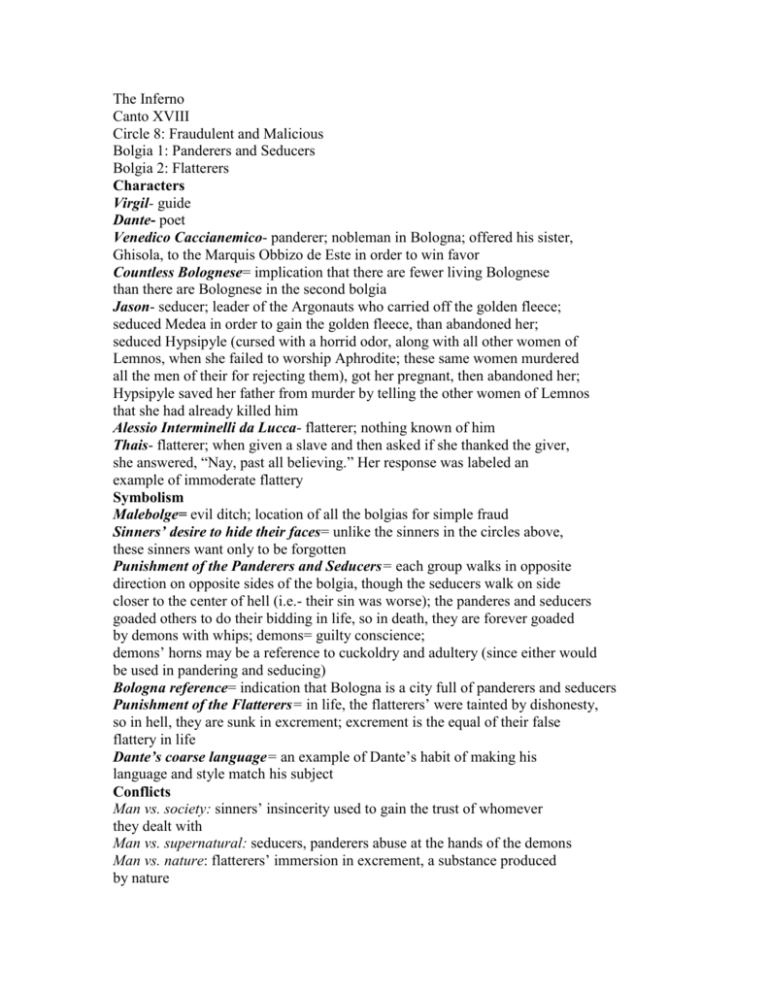
The Inferno Canto XVIII Circle 8: Fraudulent and Malicious Bolgia 1: Panderers and Seducers Bolgia 2: Flatterers Characters Virgil- guide Dante- poet Venedico Caccianemico- panderer; nobleman in Bologna; offered his sister, Ghisola, to the Marquis Obbizo de Este in order to win favor Countless Bolognese= implication that there are fewer living Bolognese than there are Bolognese in the second bolgia Jason- seducer; leader of the Argonauts who carried off the golden fleece; seduced Medea in order to gain the golden fleece, than abandoned her; seduced Hypsipyle (cursed with a horrid odor, along with all other women of Lemnos, when she failed to worship Aphrodite; these same women murdered all the men of their for rejecting them), got her pregnant, then abandoned her; Hypsipyle saved her father from murder by telling the other women of Lemnos that she had already killed him Alessio Interminelli da Lucca- flatterer; nothing known of him Thais- flatterer; when given a slave and then asked if she thanked the giver, she answered, “Nay, past all believing.” Her response was labeled an example of immoderate flattery Symbolism Malebolge= evil ditch; location of all the bolgias for simple fraud Sinners’ desire to hide their faces= unlike the sinners in the circles above, these sinners want only to be forgotten Punishment of the Panderers and Seducers= each group walks in opposite direction on opposite sides of the bolgia, though the seducers walk on side closer to the center of hell (i.e.- their sin was worse); the panderes and seducers goaded others to do their bidding in life, so in death, they are forever goaded by demons with whips; demons= guilty conscience; demons’ horns may be a reference to cuckoldry and adultery (since either would be used in pandering and seducing) Bologna reference= indication that Bologna is a city full of panderers and seducers Punishment of the Flatterers= in life, the flatterers’ were tainted by dishonesty, so in hell, they are sunk in excrement; excrement is the equal of their false flattery in life Dante’s coarse language= an example of Dante’s habit of making his language and style match his subject Conflicts Man vs. society: sinners’ insincerity used to gain the trust of whomever they dealt with Man vs. supernatural: seducers, panderers abuse at the hands of the demons Man vs. nature: flatterers’ immersion in excrement, a substance produced by nature The Inferno Canto XIX Circle 8, Bolgia 3: Simoniacs Characters Virgil- guide Dante- pilgrim Pope Nicholas III-accepted money/gifts in exchange for ecclesiastic favors; Boniface VIII- living Pope; accepted money/gifts in exchange for ecclesiastic favors; Dante held him responsible for corrupting the church; he will replace Nicholas III in the font; there will be one good Pope between Nicholas III and Boniface VIII Clement V- Boniface VIII’s successor in hell (Boniface’s earthly successor, Benedictus XI, was a good man; even more corrupt than the two Popes (Nicholas & Boniface) who came before him; still alive; may have bought the papal position; he will replace Boniface VIII in the font Constantine- Emperor credited with buying favor in the Church when he converted to Catholicism; rumored to have moved his empire to the East, giving the West to the Church Symbolism Punishment= Simoniacs hang upside down in a mockery of a baptismal font while their feet are licked by eternal flames, which correspond to their guilt; Simoniacs made a mockery of the holy office, so they are hung in a mockery of a baptism; since the Simoniacs made a mockery of holy water, they are baptized by fire; after each successor to Hell arrives, the sinners fall into crevices beneath the fonts where they remain (perhaps symbolic of the Simoniac’s material trappings or willingness to trap the Church in unholy negotiation); fire= parody of the oil used in Last Rites Virgil’s support of Dante down into Bolgia 3 and back out= Mankind’s inability to appreciate the magnitude of corruption without the support of Human Reason and the importance of Human Reason to lift mankind out of the bowels of sinful behavior (with a little divine intervention) Pope Nicholas III’s rant= mistakes Dante for Boniface VIII Dante’s rebuke of Nicholas III= evidence that Dante is learning to shed pity and condemn sinners for their sins; Virgil commends Dante’s ability to see evil for what it is, without pity or empathy Dante’s reference to the child= a child was drowning in a baptismal font (San Giovanni) and could not be removed; fearing the child’s death, Dante broke the font and was subsequently rumored to have committed sacrilege by doing so; Dante wants the incident cleared up- he had broken the font to save the child’s life Conflicts Man vs. man: Dante’s harsh words toward Nicholas III Man vs. society: Simoniacs corrupted the Church, thus corrupting society; Dante’s desire to set the record straight regarding his breaking the baptismal font Man vs. nature: Dante’s real life struggle to prevent a boy from drowning The Inferno Canto XX Circle 8, Bolgia 4: Fortune Tellers and Diviners Characters Virgil- guide Dante- pilgrim Amphiareus- foresaw his own death in a war, and attempted to run from it; an earthquake split the earth as he fled, and he fell through a fissure to his death Tiresias- diviner & magician; at one point changed himself into a woman, then changed himself back by striking two intertwined serpents with his stick Aruns- fortune teller; foretold the war between Julius Caesar and Pompey, and also predicted that the war would end with Caesar’s victory Manto- Tiresias’s daughter; sorceress who retired from the world with others who sought to learn the craft; founded Mantua Eurypylus- Greek auger who chose when the Greeks departed for Troy (but wasn’t actually present); Dante mistakenly states that Eurypylus was present in Aulis and chose the moment of departure for Agamemnon’s departure from Aulis to Troy Michael Scott- Irish scholar who studied the occult Guido Bonatti- astrologer who counseled Guido da Montefeltro about his wars Asdente- shoemaker turned diviner who won fame in the latter part of the 13th century Albert, Count of Casoldi- reference to a Count who allowed himself to be persuaded by Pinamonte de Buonaccorsi to banish all the noblemen from Mantua; once the noblemen were gone, Pinamonte led a rebellion against Albert Symbolism Punishment= Diviners and Fortune tellers sought to tell the future, so in Hell, their heads are twisted backward so that they are not allowed to even see what comes immediately before them; since sorcery is a distortion of God’s law, the body is distorted in hell; vision is blocked by tears Canticle 1 reference= The Inferno; the first of three canticles in The Divine Comedy Virgil’s lengthy discourse about the founding of Mantua= link to the background of all civilization as Dante knew it; Mantua relates to the history of Troy, Rome, Virgil, Florence Tears running down the cleft of the sinners’ buttocks= debasement of sorrow Virgil’s scolding= Virgil now points out that Dante should not feel pity for the sinners; his lack of scolding earlier in the book may be a a sign that Human Reason is fallible or simply an acknowledgement that earlier in the story, Dante wasn’t ready to recognize the base nature of evil Conflicts Man vs. nature: sinners’ deformed bodies Man vs. self: Dante’s struggle against pity for the sinners Man vs. man: Virgil’s rebuke of Dante’s pity for the fortune tellers The Inferno Canto XXI Circle 8, Bolgia 5: Grafters Characters Virgil- guide Dante- pilgrim Senator from Lucca- grafter; possibly Martino Bottaio Bonturo Dati- notorious grafter in Lucca Malacoda- demon; "bad tail;" leader of the demons Demons- Grizzly, Hellken, Deaddog, Curlybeard, Grafter, Dragontooth, Pigtusk, Catclaw, Cramper, Crazyred; sent as escorts for Dante and Virgil; names indicate their physical characteristics Symbolism Punishment= in life, these folks secretly accepted bribes for political favors; in death, the bodies of the grafters are secretly stashed in the boiling tar, just as the sinners eagerly hid money or other advantageous trades; sticky pitch (tar)= sticky fingers like those of the sinners; demons guard the grafters, ready to rip and tear them if they rise above the surface of the tar; demons= willingness to rend, tear, destroy, corrupt everything for their own satisfaction, just as the demons willingly destroy the sinners Virgil's warning to Dante= Dante was falsely charged as a grafter before being exiled from Florence, so Virgil worries that he may be in physical danger in bolgia 5; this is the only time that Dante feels physically threatened Language/Style= coarsest language in the book; Catholics do not find vulgarity or obscenity offensive, but do take offense at blasphemy and profanity Grafter from Lucca= indication that Lucca is a city full of grafters Bridges to Bolgia 6= completely destroyed, though Malacoda lies and tells the poets that the demons will lead them to the second bridge, which is supposedly still standing; earthquake that shook hell when Christ died is responsible for all the destruction Dante's fear= mankind's difficulty in putting all of his trust into Human Reason and Divine intervention Exchange between Malacoda & other demons= the demons stick their tongues out at Malacoda like a salute, which Malacoda answers with loud flatulence; mockery of military conduct/tradition Conflicts Man vs. supernatural: senator's victimization at the hands of the demons Man vs. nature: Dante and Virgil's difficulty passing through to bolgia 6 because of the damage done by an earthquake Man vs. society: sinners' actions in life Man vs. self: Dante's fear at having to go along with the demons The Inferno Canto XXII Circle 8, Bolgia 5: Grafters Characters Virgil-guide Dante- pilgrim Demon escorts- Grizzly, Hellken, Deaddog, Curlybeard, Grafter, Dragontooth, Pigtusk, Catclaw, Cramper, Crazyred; Hellken and Grizzly start fighting and fall into the pitch Anonymous Navarrese grafter- servant to King Thebault II of Navarre; he escapes the demons after Dante spoke with him, causing the brawl that ensued between Grizzly and Hellken Friar Gomita- grafter; accepted money in exchange for allowing prisoners to go free; eventually hung for grafting Michel Zanche- Vicar of Logodoro; when the King of Sardinia was captured during a war, Zanche arranged a divorce between the King and Queen, then married the Queen; murdered by his son-in-law, Branca d'Oria Symbolism Dante's description of the oddity of the demons' signaling= evidence that Dante probably had some military experience, most likely with the Tuscan army Grafter's offer= grafter's offer to lure other sinners to the surface so that he might go free fits the sin- he will give favors in exchange for something that benefits himself Demon difficulties= Grizzly and Hellken's wings became soaked with tar as they struggled in the pitch; they began to burn, so Curlybeard organized a rescue party Virgil & Dante's decision to flee= fear that the demons will now be agitated because of the loss of the sinner and the plight of Grizzly and Hellken, and may take out their frustrations on Dante and Virgil Conflicts Man vs. self: Dante and Virgil both battle fear after they witness the difficulties of the demons Man vs. society: sins of the grafters Man vs. man: the anonymous Navarrese's willingness to sacrifice other sinners so that he might go free Man vs. supernatural: demons' clawing of the Navarrese The Inferno Canto XXIII Circle 8, Bolgia 6: Hypocrites Characters Virgil- guide Dante- pilgrim Jovial Friars-monks assigned to enforce order, protect the weak, and keep the peace; they failed to follow their own laws and rather than protect the weak, they simply protected their own affairs; they were disbanded by the Pope Catalano dei Malavoti- hypocrite; Guelph; Jovial Friar of Florence in 1266; jointly served as chief officer with Loderingo, an administration more violent than any other; later, it was discovered that Catalano was working for Clement IV to destroy the Ghibellines under the guise of an impartial peacemaker Loderingo degli Andolo- hypocrite; Ghibelline; Jovial Friar of Florence in 1266; jointly served as chief officer with Catalano, an administration more violent than any other; later, it was discovered that Loderingo was working for Clement IV to destroy the Ghibellines under the guise of an impartial peacemaker Caiaphas- Jewish elder who advised that it was better for one Jew to be sacrificed to the Romans rather than all; hypocrite Annas- Caiaphas's father-in-law; had Jesus delivered to Caiaphas; hypocrite Demons- all those surviving the rescue of Grizzly and Hellken Symbolism Virgil & Dante's descent into Bolgia 6= mankind's inability to navigate through some kinds of terrain; Human Reason is necessary to carry man through difficult paths in life Punishment= sinners walk around in what appear to be beautifully elaborate robes of holy office, but which in reality are weighted; in life, hypocrites appeared to believe one thing while doing another, so in death, they appear to be in beautiful robes which are actually serving to torture them Punishment of Caiaphas and Annas= crucified the same way Jesus was crucified, as their advice is what may have led to his death; the track the other sinners must walk is very narrow, and each must walk over them as they lay crucified on the floor; these men must suffer the weight of all the sinners' hypocrisy the way Jesus had to suffer the burden (according to Christians) of all the world's sin Demons' limitations= the demons were supposed to torture those in the 5th bolgia, so they are not allowed to proceed into the other bolgias Virgil's anger= the Friars tell him that all the bridges to and from Bolgia 6 lay in rubble and Virgil realizes that Malacoda tricked him; may indicate Human Reason's danger of being duped by Evil; no matter how worldly mankind may be, all men are still naïve when compared to the Father of Lies or his minions (as pointed out by the Friar) Conflicts Man vs. supernatural: Dante and Virgil's flight from the demons Man vs. society: Caiaphas did what he thought was best for his people, but some feel he actually caused mankind to suffer more Man vs. nature: the struggle down the slope of Bolgia 6, and the coming challenge of climbing out of the bolgia The Inferno Canto XXIV Circle 8, Bolgia 7: Thieves Characters Virgil-guide Dante- pilgrim Various Thieves Serpents- chelydri: trails smoke and burns, jaculi: fly through the air before piercing their targets, pharese: plow the ground with their tails, cenchri: waver from side to side, amphisboenae: have a head at each end of its body Vanni Fucci- son of a Black nobleman; thief; he stole the treasures of San Jacomo along with two accomplices; other men were accused of the crime, and one even spent a year in prison before it was discovered who had really committed the crime; Fucci's accomplices were arrested, but Fucci fled Symbolism Virgil's anger at Dante= Virgil tells Dante that it is much too soon to tire, as the climb ahead is much greater; Virgil may be telling Dante that the ascent to Purgatory and Paradise will be a much longer climb, that Dante cannot allow himself to tire from merely climbing away from hypocrisy (renouncing hypocrisy), or that the descent into Hell to recognize/renounce will be much easier than the remainder of the journey, purification of sin Punishment= thieves are in a huge pit filled with serpents; since their hands were The instruments used to commit their sins, their hands are bound behind their backs by serpents; since thieves destroy other men by stealing their substance, their bodies are stolen repeatedly in hell and then painfully reformed; reptiles= secrecy The height of the walls= hell is on a downward slant, so the wall of each bolgia that points to the deeper sections of hell is lower than the walls facing the other direction Fucci's prophecy= Whites will be driven out of Florence by the Blacks and the Blacks will capture a White stronghold in Serravalle; Fucci only told Dante the prophecy in order to make Dante suffer Conflicts Man vs. nature: sinners plight with the serpents Man vs. man: Virgil's anger at Dante Man vs. self: Dante's attempt to not show discomfort through the difficult climb up (though it's really down) to bolgia 7 Man vs. society: sins of the thieves The Inferno Canto XXV Circle 8, Bolgia 7: Thieves Characters Virgil- guide Dante-pilgrim Vanni Fucci- thief; uttered prophecy in Canto XXIV; Cacus- Centaur in The Inferno, but in Roman mythology, he was a giant; thief; stole Geryon's cattle while it was being guarded by Hercules, so Hercules beat him to death; found in The Aenid, though Virgil never claimed Cacus was a centaur, he just said he was "half-human" Agnello Brunellesci-thief; first appears as human Cianfa-thief; first appears as a lizard, then merges with Agnello Buoso degli Abati-thief; first appears as human, then changes forms with Buoso Francesco dei Cavalcanti-thief; killed by the people of Gaville, and his family avenged his death by killing several townsmen; first appears as a tiny reptile, then changes forms with Buoso Puccio Sciancato-thief; appears as human Symbolism Last stage of Punishment= in life, thieves stole the belongings of others and made it their own, so in death, they are forced to steal forms and make them their own; since sinners change bodies so frequently, no one really knows what to call his own The merging of Agnello with Cianfa= in life, these two may have divided up the stolen goods, so in death, they attempt to divide up the pains of hell Fig= obscene gesture, similar to "the finger" in terms of meaning; even in hell, blaspheming God wins abuse from others Reference to Lucan (line 91) & Ovid (line 94)= Dante bragging that his skill in relating the transformation of the physical forms will be better than the tales woven by Lucan and Ovid; no time for modesty… heh Conflicts Man vs. man: Agnello's attack on Buoso in order to gain his human form Man vs. nature: sinners' losing battle with serpents who wind through the most sensitive regions of their bodies Man vs. supernatural: Fucci giving the figs to God The Inferno Canto XXVI Circle 8, Bolgia 8: Evil Counselors Characters Virgil- guide Dante- pilgrim Ulysses- evil counselor; planned the Trojan Horse scheme; convinced Achilles to leave Deidamia and child, after which she died of grief; stole the bust of Pallas, which strengthened the fate of Troy- Troy fell shortly after; convinced his loyal crew to continue on a journey that ended with their deaths Diomede- evil counselor; planned the Trojan Horse scheme Symbolism Punishment= Evil Counselors stole gifts from God and worked through hidden means, so in hell their bodies are stolen from sight and hidden inside flames, signifying their guilty conscience; since this sin was usually committed through verbal pursuasion, the flames resemble tongues Dante's sorrow= Dante is saddened by the future that awaits Florence, as outlined by the prophecies he's heard in hell; he wants to speak more harshly of the thieves and evil counselors, whom he blames for Florence's woes, but he controls himself; Dante recognizes that he cannot use this work as a means to debase others- that would be too much like the actions of those in hell; Dante also felt betrayed and persecuted by men he thought to be evil counselors and thieves, i.e.-those who banished him Virgil's conversation with Ulysses= Virgil felt that Ulysses and Diomede would respond better to him, since he had celebrated their earthly victories; may also symbolize that the only direct link to between Greek poetry and Roman poetry came through Latin intermediates (thus, Virgil was the link between Dante and Homer) Dante's placement of Ulysses and Diomede in this bolgia= Dante was very pro-Trojan, as they were the ancestors of Italy; tactics used by Diomede and Ulysses in the Trojan War would not be seen as evil counseling by those who were not so anti-Greek Conflicts Man vs. nature: sinners' punishment Man vs. society: sins of the evil counselors Man vs. man: the entrapment of Ulysses and Diomede in the same flame (see punishment of Paola & Francesca) The Inferno Canto XXVII Circle 8, Bolgia 8: Evil Counselors Characters Virgil- guide Dante- pilgrim Count Guido da Montefeltro- head of the Ghibellines of Romagna; had been a warrior but retired in order to save his soul; he became a monk, and was summoned by Pope Boniface VIII; Boniface had a long standing battle with the Colonna family, and he asked Montefeltro for his advice on how to destroy them; Guido hesitated, and Boniface said that he would absolve him of all guilt before Montefeltro uttered a word; believing his soul to be safe, Montefeltro told Boniface to convince the Colonnas that he was offering amnesty, and once they accepted, destroy their castle so they had nowhere to hide- Boniface followed the advice, and Montefeltro went to hell for it Symbolism Guido's approach= Montefeltro recognized Dante's speech, and knew he was from Italy; he wanted to know the state of affairs in his home country Guido's explanation of his sin= Montefeltro offered his story only because he believed that Dante would never be able to return to earth; like all the other sinners in Lower Hell, Montefeltro does not wish to be remembered Conflicts Man vs. nature: Montefeltro's immersion in flames Man vs. self: Montefeltro's realization that he had to mend his ways, and his struggle to live a just life; he lost the battle Man vs. supernatural: the dispute between St. Francis and the demons over Montefeltro's soul- since Montefeltro thought Boniface VIII had absolved him of guilt, he had not repented the advice; the demon got him The Inferno Canto XXVIII Circle 8, Bolgia 9: Sowers of Discord Characters Virgil- guide Dante- pilgrim Sowers of Religious Discord Mahomet- split from his chin to his anus with all of his organs hanging out; founder of the Islamic faith Ali- split from the top of his head to his chin; Mahomet's son-in-law; eventually succeeded Mahomet to the Caliphate Fra Dolcino- still alive; started a rebel order of monks that preached community property and community women; Clement V labeled them heretics, so they retreated to the mountains with their women; Mahomet warns that they will be starved out of their hiding place; this does indeed occur, and Dolcino and his woman, Margaret of Trent, were burned at the stake Sowers of Political Discord Pier da Medicina- throat slit, nose cut off, ear chopped off; spoke to Dante through his slit throat; offers prophecy Curio-tongue cut off; advised Caesar to cross the Rubicon, which started the Roman Civil War Mosca dei Lamberti-both arms chopped off; inadvertently started the Guelph/Ghibelline war Sowers of Discord Between Kinsmen Bertrand de Born-head chopped off, he swings it in front of him like a lantern; knight; instigated a war between Henry II and his son Symbolism Punishment= in life, these sinners separated what God intended to be joined, so in hell, their bodies are torn apart; the bodies are split by a demon according to their level of guilt, then as the sinners walk around a track, their bodies heal- thus, they are whole by the time they get back to the sword Mahomet & Ali's wounds= together, the wounds would split a human completely in half; Dante symbolizes that between the two o them, the followers of Mahomet and the followers of Christ were completely divided Pier da Medicina's prophecy= Malatestino da Rimini will invite Guido del Cassero and Angioletto da Carignano to a conference at La Cattolica; on their way to the conference, the two will be thrown overboard so that Malatestino will be able to have the city of Fano (Guido and Angioletto were Fano leaders) Mosca dei Lomberti's presence= though Dante had inquired of this man while talking to Ciacco, thinking him a noble man, he now learns of his sins; Buondelmonte dei Buondelmonti had insulted the honor of the Amidei clan by breaking off his engagement to a Buondelmonti girl in favor of a girl of the Donati line; when the Buondelmonte clan met, Mosca dei Lomberti advised them to kill Buondelmonte, which the Amidiei did, thus starting what became the Guelph-Ghibelline War Wish to be remembered= sinners in this round wish to be remembered, unlike the rest of the sinners in Lower Hell; could indicate that the discord that these sinners reaped is remembered/remaining long after their lives ended Conflicts Man vs. society: discord Man vs. supernatural: sinners repeated bouts with the demon & sword The Inferno Canto XXIX Circle 8, Bolgia 10- Falsifiers (Alchemists) Characters Virgil- guide Dante- pilgrim Geri del Bello- Dante’s cousin; sower of discord; murdered by the Sacchetti family, and had not yet been avenged Capocchio- alchemist; speaks to Dante; Florentine friend of Dante’s; burned at the stake for practicing alchemy Griffolino D’arezzo- alchemist; created fake silver and gold; took money from Alberto da Siena with the promise of teaching him to fly; when the idiot finally figured out that Griffolino had been toying with him, he had the Bishop of Siena burn Griffolino at the stake; spoke to Virgil and Dante Symbolism Punishment of Falsifiers= in life, falsifiers deceived the senses and corrupted society; in death, these people are subjected to the sum of ALL falsifications of the senses: darkness, stench, thirst, filth, disease, noise- this chaotic state would be a reflection of the world had the falsifiers’ lies been accepted; in this bolgia, the senses are an affliction rather than a guide; just as all the falsifiers used different degrees of falsification with different goals, so they are all punished differently, depending upon their “class” of falsification Alchemy= medieval chemical science and philosophy aiming to achieve a universal cure for disease, a means for indefinitely prolonging life, and the conversion of base metals into gold Scabby guys= alchemists tried to falsify nature, so now nature punishes their natural bodies with natural plagues (scabs, tearing of flesh by fingernails, etc.) Conflicts Man vs. nature: punishment of the alchemists Man vs. self: the falsifiers’ tearing of their own skin/scabs Man vs. society: sins of the falsifiers The Inferno Canto XXX Circle 8, Bolgia 10- Falsifiers (Evil Impersonators, Counterfeiters, False Witnesses) Characters Virgil- guide Dante- pilgrim Capocchio- alchemist; speaks to Dante; Florentine friend of Dante’s; burned at the stake for practicing alchemy; dragged away by Gianni Schicchi Griffolino D’arezzo- alchemist; created fake silver and gold; took money from Alberto da Siena with the promise of teaching him to fly; when the idiot finally figured out that Griffolino had been toying with him, he had the Bishop of Siena burn Griffolino at the stake; spoke to Virgil and Dante Gianni Schicchi- evil impersonator; at the request of Simone di Donati, Gianni impersonated the dead Buoso di Donati and changed Buoso’s will in favor of Simone; in the guise of the newly dead Buoso, Gianni also bequeathed up on himself, including a prized mare Myrrha- evil impersonator; daughter of the King of Cyprus; lusted after her father, and dressed up as another woman and had sex with him; when the King discovered who the girl was, he threatened to kill her; she ran away and was changed into a MyrtleAdonis was born from her trunk Master Adam- counterfeiter; the Counts Guidi of Romena ordered him to counterfeit Florentine florins of twenty-one carat gold (the usual was 24-carat); Master Adam created so many coins that a currency crisis arose, and Master Adam was burned at the stake Guido, Alessandro, their filthy brother- counterfeiting Counts Guidi; Guido died before 1300, and is the one Master Adam says is in the Bolgia Potiphar’s wife- false witness; Joseph (son of Jacob) would not return her affections, so the wife falsely accused him of attempted rape, thus landing him in jail Sinon the Greek- false witness; convinced the Trojans to take the Trojan Horse into the city, claiming it was a gift Symbolism Cappachio’s suffering the teeth of Gianni= literal reality check for a falsifier; though he had tried to create unnatural substances out of nature, he is now the victim of a natural instinct Gianni and Myrrha’s ravenous cravings (punishment of the evil impersonators)= just as these impersonators desired the appearance/bodies of other people in life, in death they literally crave the flesh of others; in life they usurped human characteristics, so in death, they may only reap animalistic imitations Master Adam’s suffering (punishment of the counterfeiters)= counterfeiters created money from plentiful sources, but craved more than what they’d created; thus, in death, though swollen and waterlogged, the counterfeiter suffers from intense thirst- they still long for something they have enough of already Potiphar’s wife and Sinon’s suffering (punishment of false witnesses)= in life, these false witnesses created fake stories, so in death, they suffer from intense fever which is known for confusing the mind; the accusations and stories created by these people greatly fevered all those around them, just as they themselves now are fevered (literally so hot that their bodies smoke) Fight between Sinon and Master Adam= comical; demonstrates the base behavior of the sinners in this lower area of hell; the catty behavior and petty arguments, along with the physical lashes with the arms, demonstrates their inability to behave on a more civilized level; designed to show the ridiculous nature of all petty arguments Virgil’s warning= Virgil needs to be sure that Dante understands that his fascination with the base argument between Sinon and Adam is, in itself, base; Virgil warns that the desire to witness base behavior/commentary is degrading; Dante is ashamed, and Virgil forgives him Conflicts Man vs. man: Gianni’s tearing of Cappochio; the slapping frenzy between Master Adam and Sinon Man vs. self: Dante’s struggle not to be amused or interested in the baser elements of human behavior Man vs. nature: punishment of the counterfeiters and false witnesses Man vs. society: sins of the falsifiers
